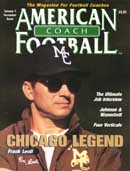AMERICAN FOOTBALL MONTHLY THE #1 RESOURCE FOR FOOTBALL COACHES
Article CategoriesAFM Magazine
|
Wannstedt—Winning Againby: Kevin Kaminsky© More from this issue Given their shared passion for late-night cheese nachos over a few Heinekens, the average nutritionist might suggest that Jimmy Johnson and Dave Wannstedt need the afternoon jog for which they've become notorious. But those who understand and appreciate their seemingly symbiotic relationship—one forged over the past two decades—will tell you otherwise. Johnson and Wannstedt were born to run. Together. After all, that's how the Miami Dolphins' head coach and his assistant head coach have done some of their best work over the years. "We laugh about this now, but we've actually made some of our biggest decisions in that kind of setting," says Wannstedt. "In Dallas we made the decision to trade Herschel Walker (to Minnesota) coming back from our noon jog. People think that decision came after some ....The full article can only be seen by subscribers.
|
|
|||||||
| HOME |
MAGAZINE |
SUBSCRIBE | ONLINE COLUMNISTS | COACHING VIDEOS |
Copyright 2026, AmericanFootballMonthly.com
All Rights Reserved





